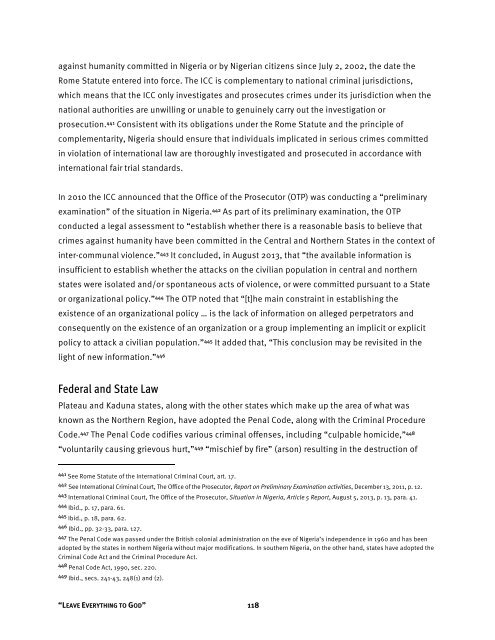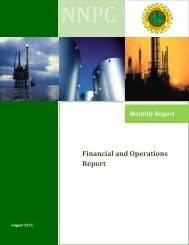You also want an ePaper? Increase the reach of your titles
YUMPU automatically turns print PDFs into web optimized ePapers that Google loves.
against humanity committed in Nigeria or by Nigerian citizens since July 2, 2002, the date the<br />
Rome Statute entered into force. The ICC is complementary to national criminal jurisdictions,<br />
which means that the ICC only investigates and prosecutes crimes under its jurisdiction when the<br />
national authorities are unwilling or unable to genuinely carry out the investigation or<br />
prosecution. 441 Consistent with its obligations under the Rome Statute and the principle of<br />
complementarity, Nigeria should ensure that individuals implicated in serious crimes committed<br />
in violation of international law are thoroughly investigated and prosecuted in accordance with<br />
international fair trial standards.<br />
In 2010 the ICC announced that the Office of the Prosecutor (OTP) was conducting a “preliminary<br />
examination” of the situation in Nigeria. 442 As part of its preliminary examination, the OTP<br />
conducted a legal assessment to “establish whether there is a reasonable basis to believe that<br />
crimes against humanity have been committed in the Central and Northern States in the context of<br />
inter-communal violence.” 443 It concluded, in August 2013, that “the available information is<br />
insufficient to establish whether the attacks on the civilian population in central and northern<br />
states were isolated and/or spontaneous acts of violence, or were committed pursuant to a State<br />
or organizational policy.” 444 The OTP noted that “[t]he main constraint in establishing the<br />
existence of an organizational policy … is the lack of information on alleged perpetrators and<br />
consequently on the existence of an organization or a group implementing an implicit or explicit<br />
policy to attack a civilian population.” 445 It added that, “This conclusion may be revisited in the<br />
light of new information.” 446<br />
Federal and State Law<br />
Plateau and Kaduna states, along with the other states which make up the area of what was<br />
known as the Northern Region, have adopted the Penal Code, along with the Criminal Procedure<br />
Code. 447 The Penal Code codifies various criminal offenses, including “culpable homicide,” 448<br />
“voluntarily causing grievous hurt,” 449 “mischief by fire” (arson) resulting in the destruction of<br />
441 See Rome Statute of the International Criminal Court, art. 17.<br />
442 See International Criminal Court, The Office of the Prosecutor, Report on Preliminary Examination activities, December 13, 2011, p. 12.<br />
443 International Criminal Court, The Office of the Prosecutor, Situation in Nigeria, Article 5 Report, August 5, 2013, p. 13, para. 41.<br />
444 Ibid., p. 17, para. 61.<br />
445 Ibid., p. 18, para. 62.<br />
446 Ibid., pp. 32-33, para. 127.<br />
447 The Penal Code was passed under the British colonial administration on the eve of Nigeria’s independence in 1960 and has been<br />
adopted by the states in northern Nigeria without major modifications. In southern Nigeria, on the other hand, states have adopted the<br />
Criminal Code Act and the Criminal Procedure Act.<br />
448 Penal Code Act, 1990, sec. 220.<br />
449 Ibid., secs. 241-43, 248(1) and (2).<br />
“LEAVE EVERYTHING TO GOD” 118




